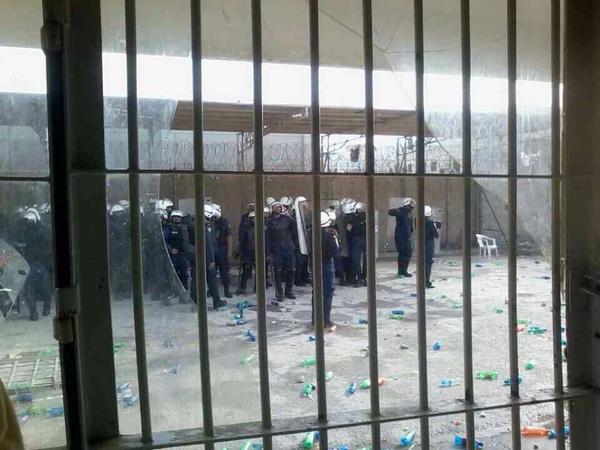On Monday, 25 January 2016, Bahrain’s public prosecutor announced that a court had sentenced 57 men to additional 15-year jail terms for their alleged involvement in the Jau Prison riots last March. The prosecutor accused the men of having “unleashed acts of chaos, riots and rebellion inside (prison) buildings,” and officially charged them with a variety of offenses, including “damaging public property, attacking police, arson and resisting authorities.”
The court’s decision comes despite mounting evidence that Bahraini authorities subjected the prisoners to severe human rights abuses before, during, and after the riots. As documented by ADHRB, BCHR, and BIRD in Inside Jau: Government Brutality in Bahrain’s Central Prison, “physical torture, prevention of medical care, and massive overcrowding remain a systemic failure of Bahrain’s prison system.” During the events of March 2015, specifically, prison officials and security personnel employed excessive force to suppress the unrest, beating inmates indiscriminately and firing tear gas into confined spaces. Though reports suggest that only a minority of prisoners took part in any unruly behavior, the authorities punished them all collectively – and long after the government had re-established control of the facility.
Now, five years after the Bahrain Independent Commission of Inquiry (BICI) called on the government to prevent torture and hold perpetrators accountable, the court’s decision to sentence 57 Jau inmates to additional prison terms demonstrates the authorities’ continued unwillingness to reform. Mohammed al-Tajer, an attorney for the accused and the brother of Ali al-Tajer, who is currently arbitrarily detained in Bahrain, argued that the government ultimately disregarded the evidence of human rights violations at Jau: “We raised a complaint that our clients were beaten during the unrest in Jau prison, but the court sentenced them at the end of the day, ignoring these complaints.”
Sam Jones is an Advocacy Fellow at ADHRB.





